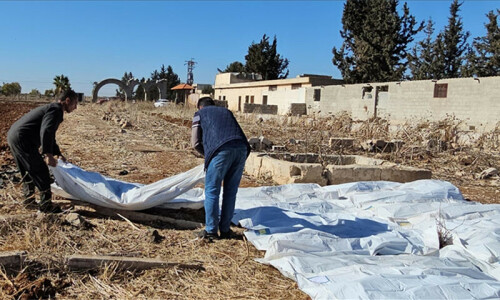PESHAWAR: The agronomy department of the University of Agriculture in collaboration with the University of Agriculture, Faisalabad, organised a training workshop on ‘dry chain technology’ for reducing post-harvest losses in seeds here on Saturday.
The training organiser Prof Mohammad Arif explained the concept of dry chain technology and its importance. He said even as increasing population put pressure on food supplies, about one-third of the total food produced for human consumption was wasted, with the majority of loss in developing countries occurring between harvest and the consumer. Retaining product dryness is the most critical factor for maintaining quality in stored non-perishable foods.
The high relative humidity prevalent in humid climates elevates the moisture content of dried commodities stored in porous woven bags, enabling fungal and insect infestations, he explained.
Prof Arif said mycotoxins (aflatoxin) produced by fungi in insufficiently dried food commodities affected 4.5 billion people worldwide. He added the term ‘dry chain’ was used to describe initial dehydration of durable commodities to levels preventing fungal growth followed by storage in moisture-proof containers.
This is analogous to the ‘cold chain’ in which continuous refrigeration is used to preserve quality in the fresh produce industry. However, in the case of the dry chain, no further equipment or energy input is required to maintain product quality after initial drying as long as the integrity of the storage container is preserved, he maintained, saying in some locations/seasons, only packaging was required to implement a ‘climate smart’ dry chain, while in humid conditions, additional drying was required and desiccant-based drying methods had unique advantages.
Dr Irfan Afzal from the University of Agriculture, Faisalabad, presented both climate and drying-based approaches to implement the dry chain to minimise mycotoxin accumulation and insect infestations in dry products, reduce food loss, improve food quality, safety and security, and protect public health. He also gave hands-on training to the participants for better understanding of the concept and practical demonstration.
University of Agriculture Vice-Chancellor Prof Jehan Bakht, who was the chief guest, advised heads of other departments of the varsity to also arrange such workshops, according to a press release.
The participants included students, faculty members, research officers, agriculture officers, and representatives of the seed companies. They were given certificates at the end of the training workshop.
Published in Dawn, December 26th, 2021















































Dear visitor, the comments section is undergoing an overhaul and will return soon.